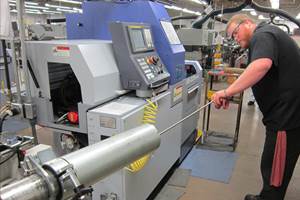Nine Common Mistakes In Business Succession Planning
Business succession planning is one of the most important—and most overlooked—tasks that a business owner should incorporate into creating his or her business plan.
Business succession planning is one of the most important—and most overlooked—tasks that a business owner should incorporate into creating his or her business plan. One CPA that I work with will advise his clients to have an exit strategy in mind from the outset. Far too often, businesses fail to survive the death of the founder because of the business owner's failure to undertake this important plan. Business succession planning can involve some complex issues. It takes forethought and planning to ensure that the business owner has the processes in place by which the business can continue to operate after the owner steps down, dies or becomes disabled.
Unfortunately, according to the Goering Center for Family and Private Business, 65 percent of family businesses don't survive being passed to the second generation, and 85 percent of family business don't survive to the third generation. One reason for these low numbers is that 38 percent of privately held business owners have not considered how they will leave their businesses (Memphis Business Journal, January 18, 2002). To ensure that your business survives, you must avoid the most common mistakes of business succession planning:
- Failure to plan, also known as procrastination. Most business owners feel that there is plenty of time to deal with what will happen to their businesses after retirement or death. They are usually wrong.
- Failure to obtain the proper valuation of the business. Because your business succession plan will likely involve selling the business or passing it to your heirs, it is important to know what the appropriate sale price or inheritance value of a business is so that plans for its purchase or paying estate taxes can be made accordingly. When it comes to valuing your business for gifting or family succession planning purposes, it is important to hire a professional valuation expert. Some of the different certifications a professional might have include ABV or CVA.
- Failure to take the time to address who will be on the succession team. This often involves a tough analysis of whether family member have the skill set to run the business or whether your key succession candidates are non-family members who have been working for the business.
- Failure to integrate your business succession plan into your estate plan. Many small business owners think that they can simply leave the business to their spouse or heirs when, in fact, the business comprises virtually all of their net worth. By leaving the business to one person, you’ve excluded all other heirs from inheritance.
- Failure to plan for disability. Because disability for an extended period of time can have an adverse impact on the business, it is important to incorporate disability planning and insurance into your business succession plan.
- Failure to identify key employees who may have concerns with your succession plan. It is important to ensure that those key employees remain with the business during any succession transfer.
- If the business is a closely held business, treating it like the family rather than as a business involving family. It’s important when the business is closely held in the family to separate the family dynamic from the business dynamic as much as possible and to recognize that these different dynamics are at work.
- Failure to diversify the business owner’s net worth from the business as a whole. Many business owners hold virtually all of their net worth in their business and find themselves in a difficult situation in a business downturn. After they are gone, their heirs may be forced to sell the business when the market for it is poor.
- Failure to plan for contingencies. If you’ve decided to leave your business to an adult child, what will happen if that adult child predeceases you? Do you have a contingent buyer available (particularly if your surviving spouse was relying on the business being an ongoing concern for his or her income)?
Like all other aspects of financial planning, failure to plan is a plan in and of itself. If you do not like the outcome of your current plan, only you can change it. Work with your financial advisors to avoid these common mistakes by beginning the planning process now. A good succession plan can always be modified as situations change, and failing to commit to a lifelong strategy should not prevent you from putting a succession plan in place that will operate for the near future.
This article is reprinted with permission from The Family Business Report sponsored by the Goering Center at the University of Cincinnati College of Business Administration.
Related Content
Emerging Leader's Dedication to Education
Instilling confidence throughout a shop floor can do wonders for company morale while increasing productivity.
Read More6 Tips for Training on a Swiss-Type Lathe
There are nuances to training a person to effectively operate a Swiss-type lathe. A shop I visited a while back offers some suggestions.
Read MoreApplying a Healthy Approach to Employee Investment
Service Center Metals’ on-site health center offers its employees and their families free same-day health care and, in return, the employer is gaining many benefits including a healthier workforce and attracting potential employees.
Read MoreThe Value of Aligning Efforts to Promote Manufacturing Careers
Successfully building the next generation of manufacturers requires a team effort between employers, educators and parents. Each of these three groups has a tremendous impact on young people’s career decisions. Without the support of all three, we are unlikely to bridge the skilled labor shortage that threatens the future growth of our industry.
Read MoreRead Next
Do You Have Single Points of Failure?
Plans need to be in place before a catastrophic event occurs.
Read More5 Aspects of PMTS I Appreciate
The three-day edition of the 2025 Precision Machining Technology Show kicks off at the start of April. I’ll be there, and here are some reasons why.
Read MoreSeeing Automated Workpiece Measurement in Real Time
User-friendly inspection software for CNC machining centers was shown at IMTS 2024 monitoring measurements between and after machining while performing SPC based on recorded measurement values.
Read More











.jpg;maxWidth=300;quality=90)










